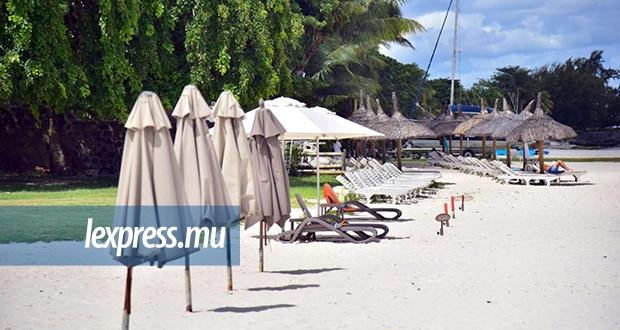
Africa-Press – Mauritius. Another bad news for Mauritius. While the country is doing everything to get off the Financial Action Task Force (FATF) gray list, it is now at the highest risk level for Covid-19 as a tourist destination. Already, the economic and public health repercussions are being felt.
“With the new CDC report, it’s like a second FATF ranking that is falling on us”, reacts Bhavish Jugurnath, economist and accountant, after the new list of Centers for Disease Control and Prevention (CDC) published September 13, 2021.
Based in the United States, the body lists tourist destinations according to their level of risk from Covid-19. Verdict: Mauritius has been classified in the fourth and final category of countries at “very high risk” of Covid-19.
Just like Afghanistan, Belize, Grenada, Lithuania, Saint Kitts and Nevis, Serbia and Slovenia. Previously, our island had a high risk, i. e. level 3. The second level reflects a moderate risk while the first, a low risk.
However, with its high prevalence of Covid-19, calculated at the rate of 500 positive cases per 100,000 inhabitants during the last 28 days for categorization at level 4, Mauritius dethrones Brazil, which goes to level 3 as well as India and Pakistan which are of moderate risk, i.
e. level 2. Mauritius even exceeds neighboring islands such as Madagascar and the Comoros classified in the first category. What does a level 4 rating mean? In fact, he advises travelers to avoid those tourist destinations listed in this category.
And if there is an obligation to go to one of these countries, we recommend a complete vaccination cycle. 4.5% growth A situation that puts the lead in the wing of our tourism in the face of the complete reopening of the borders on October 1st.
This sector is not the only one to suffer. The categorization of the CDC has serious economic consequences for Mauritius. “Definitely, the visibility of Mauritius takes a hit in the professional sectors.
It was thought that the economy would do better with the reopening of the territory. There will be a direct effect on visitors who will hesitate to come to Mauritius,” says Bhavish Jugurnath.
If economic growth forecasts were around 6% through December 2021, the CDC’s ranking is likely to reduce this rate to 4.5%, he predicts. According to him, the harmful effects reverberate at all levels.
For example, in finance and technology, several companies starting to return to face-to-face work had to backtrack and reinstate teleworking in the face of the virulence of Covid-19, he underlines.
Ditto for foreign investment, which will be largely affected. “The CDC report will be read around the world. The months of October to December are hotspots for tourist and commercial income.
The absence of visitors and investors will play to our detriment. Exports are also at half mast with freight prices which continue to soar. We can only hope that other sectors catch up.
” However, here again, Maurice is navigating in troubled waters, notes, for his part, the economist Azad Jeetun.
“We already had great hopes for the tourism industry, but the high prevalence of Covid-19 here discourages foreigners from setting foot on our territory, including those wanting to invest.
Everyone follows this CDC classification closely. Besides, there are embassies everywhere. We must not believe that this report will remain confined”, he declares.
According to him, the manufacturing sector is also suffering. As the existing capacities are fully saturated, this area is struggling to find new investors. For Dr.
Vasantrao Gujadhur, former director of health services at the Ministry of Health and Welfare, the public health implications of the CDC’s rankings are enormous.
“It demonstrates how Maurice manages his system. Covid-19 positive cases are on the rise while the number of tests for the disease is decreasing. In such a virological situation, we should have increased detections”, he confides.
Thus, the more cases are diagnosed, the more we will advocate the isolation of positive patients, which will thwart the circulation of the virus within the community.
He maintains that the number of deaths communicated must reflect reality more. Dr. Dawood Oaris, president of the Association of Private Clinics, remains more optimistic about the vaccination rate.
“Despite the increase in positive cases, patients are mostly asymptomatic and can be treated at home. Now for tourism, everything will depend on the reaction of travelers from Europe and other countries,” he says.
For his part, the former director of health services insists that Mauritian citizens, business people, students and foreign workers, among other travelers, will all be affected by the CDC classification.
Moreover, in terms of international student recruitment, the pandemic has had a negative impact, concedes Professor Mari Jansen Van Rensburg, Campus Director of Middlesex University Mauritius.
“At this point, we cannot confirm whether the change to the CDC roster will discourage young foreigners intending to study here. We have not received any file withdrawals from those scheduled to start their program at the end of September,” she explains.
While several institutions are largely impacted by the virus, Middlesex University Mauritius is resisting with an international cohort representing 36 nationalities and 45% of our student population.
“We hope that Mauritius’ ranking on the CDC list will change as more people get vaccinated,” she says. In terms of public health, Bhavish Jugurnath and Azad Jeetun argue that the CDC report encourages accentuating and intensifying health protocols.
Because with the positive cases and the deaths which follow one another, the medical stakes are crucial for the local population. Health wields vaccination rate as a defense
As a disguised response to the CDC, the Ministry of Health issued a press release last night, notably via the Government Information Service, about the reopening of borders on October 1.
“Mauritius reopens its borders on the 1st of October 2021, with one of the highest full vaccination rate in Africa”, proclaims the document, visibly intended for the international, since it speaks of “the Indian Ocean Country of Mauritius”.
Without citing the level 4 ranking of Mauritius once, it is written that the country continues with its “proactive and transparent response to the Covid-19 crisis”.
“The nation’s modern health service has coped well throughout the pandemic, implementing strong protocols”, further specifies the ministry, which insists on a low hospitalization rate (“3% of patients over the last 28 days.
most due of comorbidities rather than symptoms of Covid-19”). The press release mentions 45 deaths since March 2020, attributed directly to Covid-19 out of 1.3 million inhabitants.
In addition to Kailesh Jagutapl, he also quotes Dr Laurent Musango, WHO representative in Mauritius, who ends with “Mauritius is doing well” Mixed feelings from tourist operators
Two weeks before the complete reopening of the borders, tourist operators are preparing to welcome the first tourists. But Mauritius is now classified as “Very High Risk” for travellers.
What impact will this classification have on tourist arrivals at the opening? Ajay Jhurry, president of the Association of Tourist Operators, believes bookings will not be affected for October but could be as the months go by.
“Many airlines have reviewed their reservation policies. There is a type of plane ticket that allows the trip to be postponed at no additional cost.
If tourists have bought their ticket, they will hesitate before traveling. Traveling today carries risks. ” According to him, as long as Mauritius is on a list of countries at risk, tourists will assess the situation before embarking on a trip.
“Tourists will think twice before coming to Mauritius. We have to limit the damage to open in a smart way.
If tomorrow you have to postpone the opening, you might as well do it. Si dimé pé invite lamor bizin fer enn swa. ” Ajay Jhurry also wonders about the septaine.
“Did we not rush to get out of the fortnight? Shouldn’t it be degressive? Faced with the reopening of borders, which will be a reality, he believes that a national awareness campaign is needed.
On the side of the hoteliers, the situation is not alarming, it is said in the middle. It turns out that the percentage of reservations for the month of October and November is 35% on average and they expect this figure to climb.
This suggests that the market is moving in the right direction. “Because at the health level, everything was done as it should be, even better compared to other destinations. The results speak for themselves. ”
Being “relatively covid free” is advantageous note the hoteliers, if we compare the figures compiled by the World Health Organization (WHO) on Mauritius and the other islands of the Indian Ocean.
The percentage of infected Mauritians is 1.01% unlike the Maldives and Seychelles, which have 15.88% and 20.93% of their populations, respectively. Even if it is not comparable in terms of population, it is said that Mauritius only opens to vaccinated people, unlike the Seychelles and the Maldives.
“We are alarmed for 1% when it is minimal”, highlight the hoteliers.
They claim that the reopening is taking place under optimal security conditions. “The vaccination rate is good. The protocol is well established. We are always rebuilding trust to convince travelers to come back.
The planes are full. The first signs are positive. Now, institutional communication must support the marketing efforts that are being made by the MTPA.
” Umarfarooq Omarjee, Executive Director of Omarjee Aviation, displays his optimism. According to him, most of the first flights in October are full.
“Tourists will take advantage of it because there are no restrictions,” says our interlocutor.
It also shows that the capacity rate in hotels is 35-40% and that for the last two weeks of December, it will be around 75%. “We are certainly far from the 2019 figures, but our main markets will not be affected.
It is true that we are facing an outbreak of cases. But we also have the vaccination and the protocol that we have put in place. ” As for boaters, Karl Lamarque of Karlos Excursions displays caution.
Reason why he does not intend to launch his leisure activities for the reopening. “I didn’t prepare for October. The situation is too critical. The risk of contamination is too high. Even the vaccine is not immunity. I’m not going to expose myself. ”
As for Joomeet Aubeeluck, president of the Federation of beach merchants, he believes that “quality” tourists compared to those “of the mass”, will backtrack before coming to Mauritius.
For More News And Analysis About Mauritius Follow Africa-Press






